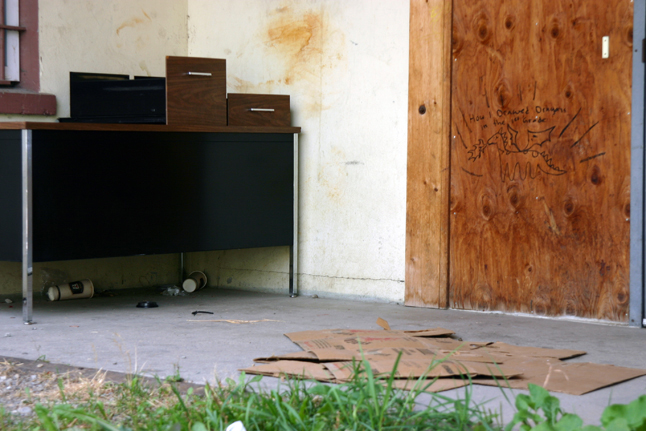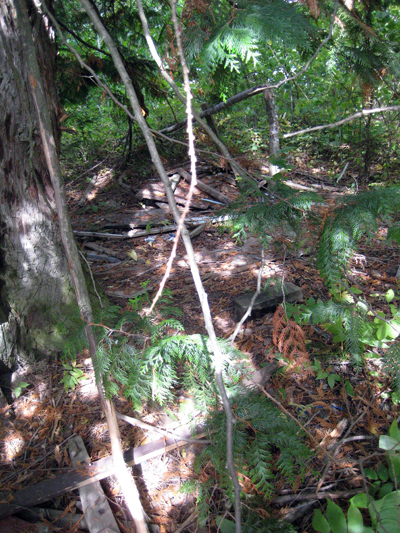
By David F. Rooney
Revelstokians need to have a public discussion about homelessness in our community and what to do about it, say the directors of the Revelstoke Community Housing Society (RCHS).
The society has embarked on a community-wide study of the local homelessness issue, which is expected to be completed by the end of July, and the preliminary results are already startling.
Nicole Fricot, a consultant hired by the RCHS in April, said she has been talking to as many people in town as possible to generate a sense of how homelessness is perceived both officially and anecdotally by the public and by various agencies.
“So far this is what I’ve come to understand: People think that with two or three exceptions the homeless in Revelstoke are from elsewhere,” she told the RCHS regular meeting, held after its AGM at the Business and Visitor Information Centre on Monday, June 2.
But the people at the Women’s Shelter know differently, as do staff at Community Connections.
Fricot, who finished high school in Salmon Arm then pursued a degree in education at UBC and an MBA at the University of Calgary, said she was told the Women’s Shelter occasionally takes in women and children who are not seeking shelter from abusive partners. They seek temporary shelter because they have nowhere to go. Unfortunately, the Women’s Shelter can’t help them for more than a few days because helping the homeless is not their mandate. Nor can they send them onto secondary housing because that is reserved for women and children who have been abused.
Then there are people who are couch surfing. No one knows how many people are doing that but some people have reported to Fricot that several girls in town are paying for shelter with sex.

Some homeless people have used empty entryways in some of the downtown alleys as crude bivouacs over the years but others are staying in the woods around town.
“We have a population of people who are living in the woods,” said Cathy Girling, the Community Connections Social Justice Advocate who sits on the RCHS board. “They show up on Mackenzie Avenue every day. They are from here.”
Then there are the homeless people who are shifted around from community-to-community by the RCMP, said Councillor Phil Welock.
“The police play a major role,” he said, adding that, for instance, Revelstoke Mounties will occasionally drive a homeless person to Rogers Pass where they’ll be met by an officer from the Golden detachment who will drive them on to that community. This is most often done with non-local homeless people who have out-stayed their welcome.
Anecdotal evidence suggests that there is a local population of people who are homeless however accurate numbers are hard to come by but Fricot hopes to have some when she next reports to the RCHS on July 7. And those accurate numbers are critical when it comes down to deciding whether to create a shelter program because without an accurate picture of homelessness in Revelstoke Fricot said it is hard to tell if “an emergency shelter is something Revelstoke realistically needs.”
Thoughtful Revelstokians have long recognized that there is a homeless population and Community Connections has taken some strides towards addressing the problem. Its Housing Outreach Program assists persons who are homeless, or at extreme risk of becoming homeless, to access housing in Revelstoke. Housing Outreach Worker Melissa Jameson can help overcome barriers to suitable, affordable housing in a variety of ways including:
• Assistance applying for Income Assistance (Welfare);
• Referrals to other community resources; and
• On-going support for our housed clients (and the landlords who house them).
Jameson has even written about homelessness in Revelstoke. (Please click here and here to read past Current stories about her work.)
There has even been an emergency shelter program of sorts that saw a homeless woman, Judy Lynn Frye, given shelter at a local motel until she died there in 2010. Judy’s story informed a lot of people — at least for a while — about Revelstoke’s homeless people. (Please click here to read a story about her death and here to read about the touching public commemoration held in her honour.)
Judy’s hard life and lonely death sparked some discussion in Revelstoke about ways to assist our homeless people.
The notion of an emergency shelter has been suggested before, but a clear and well-organized program will take a lot of money and effort to organize. It will also require some hard decisions. BC Housing will provide base funding for a shelter program — there is no set number of beds available in cities our size; they seem to range from 5 to 15 — but the money to actually run it would have to be found locally.
Fricot noted that successful emergency shelter personnel in Nelson and Vernon cautioned her that because Revelstoke is “an attractive community,” homeless people from elsewhere might start migrating here.
However, that can be managed. Nelson, for instance will provide three days of shelter for transients but only three days. Once they’ve exhausted those three days the transients are on their own.
And even truly local homeless people are only allowed to stay in the shelter for 30 days. Secondary housing is available in some cities such as Nelson and Vernon but those who are offered secondary housing must be enrolled in locally supported programs to help them with drug and alcohol addictions, mental health problems and employment. BC Housing does not offer financial support for those kinds of programs so some agency would have to be found to sponsor them and funding would — Again! — have to be found to support them.
If the society decides to help sponsor an emergency shelter program it will have to decide if it will run it or help create a separate organization to do that.
There is a lot more to this issue than meets the eye and Nicole Fricot is eager to hear what Revelstokians have to say about this issue.
You can find out more about her on her Facebook page and if you’d like to contact her you can do so by sending her an e-mail at nfricot@gmail.com.



